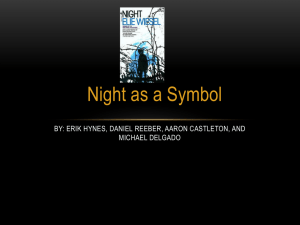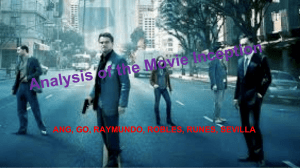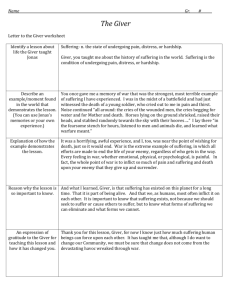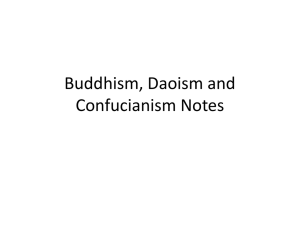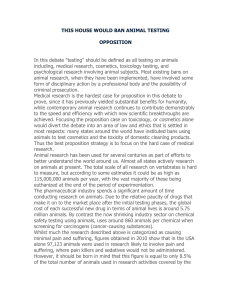Notes - Bonnyville Baptist Church
advertisement
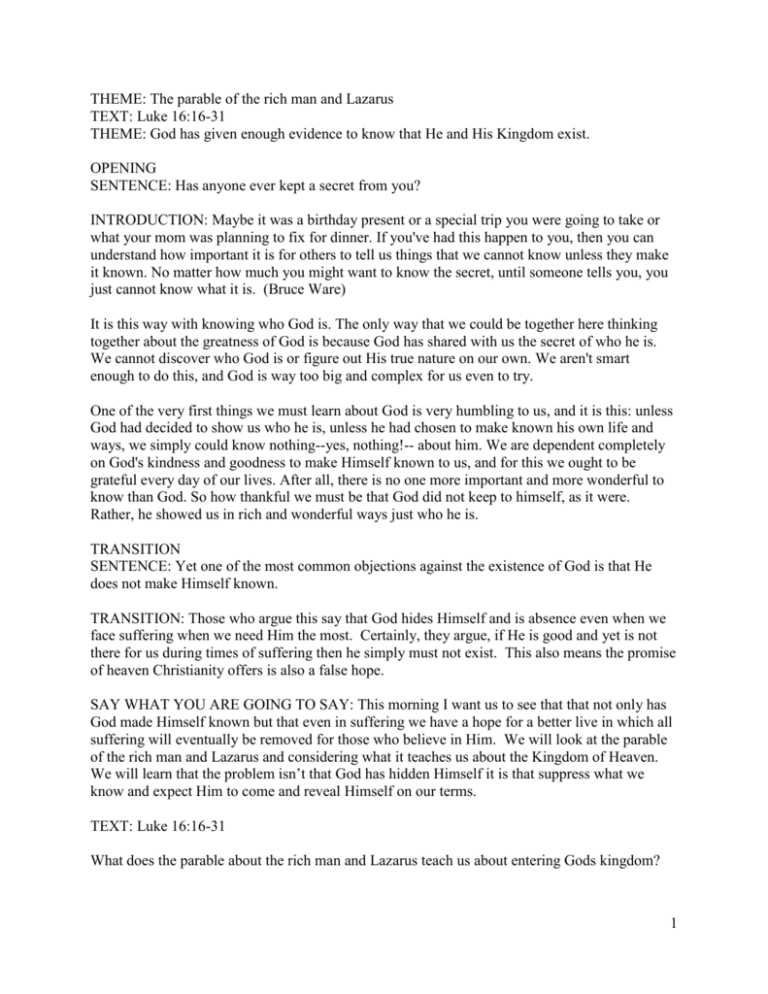
THEME: The parable of the rich man and Lazarus TEXT: Luke 16:16-31 THEME: God has given enough evidence to know that He and His Kingdom exist. OPENING SENTENCE: Has anyone ever kept a secret from you? INTRODUCTION: Maybe it was a birthday present or a special trip you were going to take or what your mom was planning to fix for dinner. If you've had this happen to you, then you can understand how important it is for others to tell us things that we cannot know unless they make it known. No matter how much you might want to know the secret, until someone tells you, you just cannot know what it is. (Bruce Ware) It is this way with knowing who God is. The only way that we could be together here thinking together about the greatness of God is because God has shared with us the secret of who he is. We cannot discover who God is or figure out His true nature on our own. We aren't smart enough to do this, and God is way too big and complex for us even to try. One of the very first things we must learn about God is very humbling to us, and it is this: unless God had decided to show us who he is, unless he had chosen to make known his own life and ways, we simply could know nothing--yes, nothing!-- about him. We are dependent completely on God's kindness and goodness to make Himself known to us, and for this we ought to be grateful every day of our lives. After all, there is no one more important and more wonderful to know than God. So how thankful we must be that God did not keep to himself, as it were. Rather, he showed us in rich and wonderful ways just who he is. TRANSITION SENTENCE: Yet one of the most common objections against the existence of God is that He does not make Himself known. TRANSITION: Those who argue this say that God hides Himself and is absence even when we face suffering when we need Him the most. Certainly, they argue, if He is good and yet is not there for us during times of suffering then he simply must not exist. This also means the promise of heaven Christianity offers is also a false hope. SAY WHAT YOU ARE GOING TO SAY: This morning I want us to see that that not only has God made Himself known but that even in suffering we have a hope for a better live in which all suffering will eventually be removed for those who believe in Him. We will look at the parable of the rich man and Lazarus and considering what it teaches us about the Kingdom of Heaven. We will learn that the problem isn’t that God has hidden Himself it is that suppress what we know and expect Him to come and reveal Himself on our terms. TEXT: Luke 16:16-31 What does the parable about the rich man and Lazarus teach us about entering Gods kingdom? 1 I. God’s Kingdom is Upside Down- we enter based on humility and faith. (19-22) 19 “There was a rich man who was dressed in purple and fine linen and lived in luxury every day. 20 At his gate was laid a beggar named Lazarus, covered with sores 21 and longing to eat what fell from the rich man’s table. Even the dogs came and licked his sores. 22 “The time came when the beggar died and the angels carried him to Abraham’s side. The rich man also died and was buried. A. The rich man had wealth and esteem- things the world values. This is a man who had it good. He knew little of suffering in any significant meaning of the word. This is a man who could not argue, “Because suffering exists in my life I cannot believe in a good God.” To me this man illustrates one of the great ironies of the “The Problem of Evil” as argument against God’s existence. People who have the greatest access to pleasure and prestige in this life tend also to be ones most likely to reject God. This man exemplifies this reality. We cannot have it both ways. On the one hand we cannot enjoy the great blessings and pleasures of this life and we feel we don’t have space for God or a need for Him yet when we face suffering deny His existence because we do not hardship in our lives. Yet this man is a personification of what the world craves for. Like him we can easily value wealth and prestige over faith in God and a relationship with Him. B. The poor man had humility and faith- things God values. The poor man personifies one who is suffering and what the world seeks to avoid. He lived in pain, humiliation, and poverty. Yet, it appears it is his suffering and humility that causes him to cry out to God for help and support. It is his suffering that brings him to a place where he realizes his utter dependence on God. The suffering, instead of driving him away from God or denying His existence, draws him closer to God because he has no one else to turn to. Humility is a value God honors and when we realize our dependence on him it shapes how we live. C. We enter heaven by honoring God’s values. God does not grant us access into His kingdom based on what men value in our present world. The present lifestyle of the rich and famous does not translate into eternal bliss- the opposite may be true. God does not value wealth or prestige. He values humility and trust in Him. I Corinthians 1:26-31 “For look at your own calling as Christians, my brothers. You don’t see among you many of the wise (according to this world’s judgment) nor many of the ruling class, nor many from the noblest families. But God has chosen what the world calls foolish to shame the wise; he has chosen what the world calls weak to shame the strong. He has chosen things of little strength and small repute, yes and even things which have no real existence to explode the pretensions of the things that are—that no man may boast in the presence of God. Yet from this same God you have received your standing in Jesus Christ, and he has become for us the true wisdom, a matter, in practice, of being made righteous and holy, in fact, of being redeemed. And this makes us see the truth of scripture: ‘He who glories, let him glory in the Lord. 2 ILLUSTRATE: An elderly man had serious hearing problems for a number of years. He went to the Doctor and the doctor was able to have him fitted for a set of new technology hearing aids that allowed the gentleman to hear 100%. He went back for a checkup and the Doctor confirmed: “your hearing is perfect. Your family must be really pleased that you can hear again.. To which the gentleman said, “Oh, I haven’t told my family yet. I just sit around and listen to the conversations. I’ve already changed my will three times!” APPLY: We often forget that God is always around hearing what we say, observing how we live and noting what we believe. He evaluates us on His terms- not ours. Ultimately there is only one person to whom we need to find favor- that is God. THEME: God has given enough evidence to know that He and His Kingdom exist. What does the parable about the rich man and Lazarus teach us about entering Gods kingdom? II. God’s Kingdom is a wonderful place- those who enter leave suffering behind. (23-26) 23 In Hades, where he was in torment, he looked up and saw Abraham far away, with Lazarus by his side. 24 So he called to him, ‘Father Abraham, have pity on me and send Lazarus to dip the tip of his finger in water and cool my tongue, because I am in agony in this fire.’ 25 “But Abraham replied, ‘Son, remember that in your lifetime you received your good things, while Lazarus received bad things, but now he is comforted here and you are in agony. 26 And besides all this, between us and you a great chasm has been set in place, so that those who want to go from here to you cannot, nor can anyone cross over from there to us.’ A. The rich man entered Hades- a place of torment. Notice how the roles are reversed. The man who epitomized what is good in this world is now found tormented. On earth he had no space for God in his life of extravagance and comfort yet now realizes his blunder and asks to warn others. Unlike Lazarus who had no control over his suffering this man’s suffering is a consequence of his neglect and willful ignorance. B. The poor man entered heaven- a place of plenty and comfort. We see in this man one of the answers to the problem of evil. That is that suffering causes us to realize our utter dependence on God and is not permanent for those who trust God. The man who once endured the humiliation from people like the rich man is now found being asked to dip his finger in the water to try to appease the tormenting thirst of the rich man. His suffering has ended and he is in a place of eternal bliss. C. There is an uncrossable chasm between the two. Death brings our opportunity to decide to trust God to a close. Once we die the decisions we have made on this earth of permanently fixed. Our place for eternity is set and there is no place to cross over. That means that the decisions me make now regarding where we stand with God 3 have permanent ramifications. You cannot reconsider once the certainty of eternity has been revealed through the portal of death. ILLUSTRATE: In a recent (2015) interview in GQ magazine, actor Nick Nolte shares that growing older has been a painful experience. When asked "When was the last time you cried?" Nolte said: Today. I cry every day. … I cry when I try to get out of bed, because I'm in my 70s and my body hurts like hell. Once my joints are moving, I'm all right, but those are my first tears in the morning, wondering if the pain is going to get worse or get better … At my age, a lot of your friends start dying, and that'll always bring on a good cry. Last summer, it was [screenwriter and director] Paul Mazursky. He had internal organ failure. … His wake was classic. I saw faces I hadn't seen in years. Mel Brooks. Richard Dreyfuss, who I hadn't seen since we filmed Down and Out in Beverly Hills. It was a great wake, but then you can't help but think about your own funeral and what that might be like. (Davy Rothbart, "The GQ+A: Nick Nolte Cries Every Day, Thinks About His Own Funeral" GQ (1-28-15) APPLY: All of us like Nick Nolte should think about the reality that death is the end of life on this earth- but not eternity. Now is the time to think about God and the afterlife because once we die we have no more opportunities to choose has passed. THEME: God has given enough evidence to know that He and His Kingdom exist. What does the parable about the rich man and Lazarus teach us about entering Gods kingdom? III. God’s Kingdom is Knowable- there is sufficient evidence for it. (27-31) 27 “He answered, ‘Then I beg you, father, send Lazarus to my family, 28 for I have five brothers. Let him warn them, so that they will not also come to this place of torment.’ 29 “Abraham replied, ‘They have Moses and the Prophets; let them listen to them.’ 30 “‘No, father Abraham,’ he said, ‘but if someone from the dead goes to them, they will repent.’ 31 “He said to him, ‘If they do not listen to Moses and the Prophets, they will not be convinced even if someone rises from the dead.’” A. Creation and the Scriptures all speak of God’s eternal nature and paradise. In Psalm 19:1 we are told, “The heavens declare the glory of God; the skies proclaim the work of his hands. 2 Day after day they pour forth speech; night after night they reveal knowledge. 3 They have no speech, they use no words; no sound is heard from them. 4 Yet their voice[b] goes out into all the earth, their words to the ends of the world. In her book “Pursing Truth” Nancy Pearcy reminds us that Romans 1 gives us a template for examining any worldview. She lists five principles from the passage. 4 1. We all have access to evidence for God through creation. This evidence alone is adequate to make us aware of his presence and existence. 2. We all suppress the evidence for God from creation. 3. We all create idols to take the place of God. The most fundamental decision we all face over the course of our lives is what we will recognize as the ultimate reality, the uncaused source and cause of our existence. Everything else in our worldview depends on that initial decision. 4. God gives us up to the consequences of our idols—to a “debased” mind. 5. God gives us up to the consequences of our idols—to “dishonorable” behavior. B. God gives enough evidence to believe but not enough to coerce. If I am in an airplane and I am asked to jump from 30,000 feet I know with certainty I will fall to my demise. It is really no decision in that I know with certainty that gravity will cause me to fall. In a relationship with God He wants to grant us the freedom to make a choice to love Him. He will give us the evidence we need to make both an intellectually and emotionally sound decision but not so much as to remove as a viable decision altogether. C. Minds can be so closed as to reject even the resurrection of the dead. The question we must ask is not, “Does God give us sufficient evidence to trust and follow Him?” the question is, “What is sufficient evidence? How much is enough?” The answer is clear, “We have enough evidence and any more will not persuade the person who chooses not to believe.” ILLUSTRATE: In February 2015 the Higher Education Research Institute released the results of its annual "Freshman Survey," a questionnaire given to over 150,000 first-year college students in the United States. In 2014, 27.5 percent of incoming college freshmen selected "none" as their religious preference, the highest rate since the survey began in 1971. Thirty years ago, only 10 percent of incoming students identified as "nones." A writer for Yale University's Yale Daily News noted that 34 percent of Yale's freshman class identified as having no religion. The writer, Scott Greenberg, offered these insightful comments: “The secularization of college students in America has seemed a foregone conclusion for some time, yet it represents a momentous shift for our university and society at large that we have not yet come to grips with. I submit that even the best of our secular institutions have not yet been able to replicate what religion used to provide to its followers. … [In particular], there is one traditional role of religion that few communities at Yale have figured out how to fill: the role of moral compass. Religion presented constant demands to its adherents about how to live better, using regular rituals and communal norms to spur members constantly to moral action. On the other hand, there is no evidence that Yale has developed any comparable institutional frameworks for ensuring that Yale students are more ethical when they graduate than when they arrive. Morality isn't something we talk much about as a campus … Violence, lying, cheating, and greed remain rampant in our society, and few institutions have stepped up to help people to be better. (Scott Greenberg, "Greenberg: Filling Religion's Void," Yale Daily News (2-10-15) APPLY: We cannot pretend that the ongoing trend toward secularization due to people denying they have “sufficient evidence” to believe in God will not have lasting and significant 5 implications. Just as it lack of faith in God impacts our eternal destiny it will also impact our society while on this earth. Without a moral compass mankind is at risk on all fronts. THEME: God has given enough evidence to know that He and His Kingdom exist. SAY WHAT YOU HAVE SAID: This morning we have seen that not only has God made Himself known. Even in suffering we have a hope for a better life in which all suffering will eventually be removed for those who believe in Him. We learned that the problem isn’t that God has hidden Himself but it is that we suppress the powerful evidence He does give. TIE INTO OPENING SENTENCE: God is not keeping Himself a secret. He has made Himself known. If you don’t see Him it is because you are expecting Him to reveal Himself according to your own terms. APPLY TO SPECIFIC AUDIENCE: 1. If you have rejected God because you do not see the evidence ask yourself, “Could the problem not be lack of evidence but of wanting God to reveal Himself to you on your terms?” Could it be you are suppressing the evidence? 2. Are you too busy pursuing life’s pleasures that you fail to make time to honor the things that God honors or value the things He values? 3. Are you frustrated because the suffering you are presently going through makes no sense to you? Are you letting it get you down instead of using it as a opportunity to draw closer to God? HAYMAKER: I heard a story about a guy who, ever since he was a little boy, his parents had promised to give him a beautiful car to drive when he turned 16. He looked forward to parking it in the family’s barn where it could stay warm and dry. Only first his dad would have to get rid of that old car sitting in the barn. He couldn’t wait for his dad to haul it off to the dump to make way for his dream car. But when would that day come? When would that new car arrive? When would his dad get rid of that old junky car under the tarp? Then one evening in early summer he heard strange sounds coming from the barn. It sounded like an engine. What was going on? Peering into the darkness he noticed a light was on in the barn. He walked into the warm night air, down the dirt path, and poked his head into the barn door. When he saw the tarp, rolled up and left against the door, he excitedly thought, Dad is finally getting rid of that junky old car! Then he looked and saw one of the most incredible sports cars in automotive history. It was a Corvette, but not just any Corvette. It was the coveted, beautiful, powerful 1963 Corvette 327 V8 with a split window, aluminum knock-off wheels, painted candy apple red. So that was the car underneath the tarp all those years. He stood there stunned. It was always there, just waiting for him to turn 16. His father looked up, and with a broad smile, he said, “Come on, son. Let’s take her for a ride.” In the same way, this coveted, beautiful and powerful inheritance I just described is “kept in heaven for you.” It’s there now. Someday the Lord himself will roll up the tarp and let you see it in all its glory. 6

